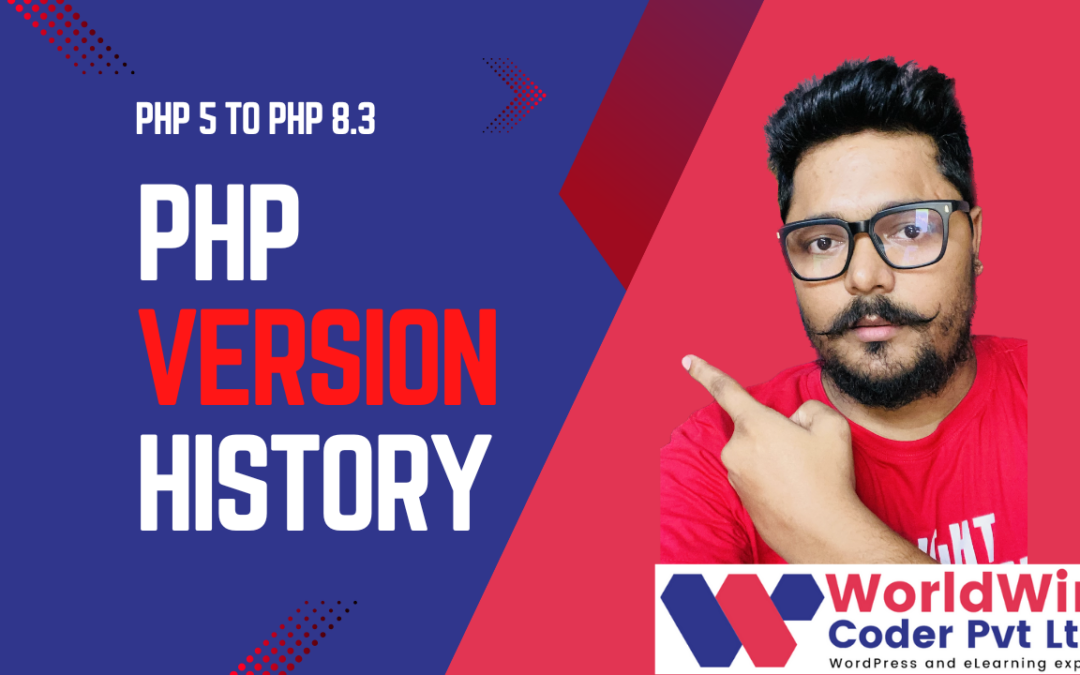PHP Version History: Key Features & Enhancements from PHP 5 to PHP 8.3
PHP has undergone significant evolution, bringing new features, performance improvements, and security updates with each version. Here’s a look at the most impactful updates from PHP 5 onwards to help you understand what each version offers.
PHP 5.x (2004 – 2014): Laying the Foundation for Modern PHP
- PHP 5.0 (2004)
- Introduction of Object-Oriented Programming (OOP): PHP 5 introduced a robust OOP model, supporting classes, inheritance, encapsulation, and polymorphism, which helped PHP become more versatile.
- PDO (PHP Data Objects): PDO provided a unified database access interface, supporting prepared statements, which enhanced security and made SQL injection harder.
- Improved Error Handling: Exceptions were introduced, enabling developers to write more reliable code by handling errors gracefully.
- PHP 5.3 (2009)
- Namespaces: This addition allowed better code organization by grouping related classes, functions, and constants.
- Anonymous Functions & Closures: PHP 5.3 introduced anonymous functions and closures, allowing developers to write more concise and functional code.
- Late Static Binding: This feature improved inheritance by allowing static references to the called class.
- PHP 5.4 (2012)
- Short Array Syntax: The new
[ ]syntax replaced the oldarray()for cleaner and shorter code. - Traits: PHP 5.4 introduced traits, allowing code reuse across classes without traditional inheritance, which improved flexibility in OOP.
- Built-in Web Server: A basic web server was introduced for testing purposes, making local development more accessible.
- Short Array Syntax: The new
- PHP 5.5 (2013)
- Generators: This new feature allowed developers to create iterators more efficiently using the
yieldkeyword. finallyKeyword: Adding to try-catch,finallywas introduced for code that should execute regardless of exceptions.- Password Hashing API: A simple and secure password hashing function was introduced for better security.
- Generators: This new feature allowed developers to create iterators more efficiently using the
PHP 7.x (2015 – 2020): Performance Boost and Modernization
- PHP 7.0 (2015)
- Significant Performance Boost: With PHP 7, the Zend Engine 3.0 doubled performance, leading to faster page loads.
- Scalar Type Declarations: Type declarations for parameters (like
int,float,string, andbool) were introduced for stricter typing. - Return Type Declarations: This version allowed defining the return type for functions, enhancing code readability.
- Null Coalescing Operator (
??): This new operator simplified conditional expressions by providing a concise syntax to check fornull.
- PHP 7.1 (2016)
- Nullable Types: PHP 7.1 allowed types to be nullable by prefixing them with
?, meaning a parameter or return type could accept a specified type ornull. - Void Return Type: This version introduced
voidas a return type, making code clearer by specifying functions that don’t return values. - Multi-catch Exception Handling: PHP 7.1 enabled multiple exceptions to be caught in a single block, improving error handling efficiency.
- Nullable Types: PHP 7.1 allowed types to be nullable by prefixing them with
- PHP 7.2 (2017)
- Argon2 Password Hashing: PHP 7.2 added support for Argon2, a modern and secure hashing algorithm for better password security.
- Object Type Hinting: Developers could now use
objectas a type hint for function arguments. - Deprecated
each()Function: Theeach()function was deprecated, favoring more performant array handling functions.
- PHP 7.3 (2018)
- Flexible Heredoc and Nowdoc Syntax: PHP 7.3 made these syntaxes easier to use, enhancing readability in multi-line strings.
- Array Destructuring with List: The list syntax was enhanced, allowing array keys in list assignments.
- JSON_THROW_ON_ERROR: This option threw exceptions when JSON errors occurred, improving error handling when working with JSON.
- PHP 7.4 (2019)
- Typed Properties: PHP 7.4 allowed properties in classes to have types, bringing it closer to strongly typed languages.
- Arrow Functions: Shortened syntax for functions using
fnwas introduced, making inline functions more concise. - Preloading: With preloading, commonly used PHP files could be loaded into memory, significantly boosting performance.
PHP 8.x (2020 – Present): New Syntax and JIT Compilation
- PHP 8.0 (2020)
- Just-In-Time (JIT) Compilation: This feature improved performance for CPU-intensive tasks, opening possibilities for PHP in non-web applications.
- Union Types: PHP 8.0 introduced union types, allowing parameters to accept multiple types.
- Named Arguments: Functions could now be called with named parameters, making code more readable and arguments more flexible.
- Match Expression: Similar to
switch, but more concise and flexible. - Attributes: Native support for metadata annotations was introduced, allowing custom attributes on code elements.
- PHP 8.1 (2021)
- Enums: PHP 8.1 added native support for enumerations, improving type safety.
- Fibers: Fibers introduced a way to handle asynchronous code, supporting concurrency within PHP applications.
- Intersection Types: Building on union types, intersection types required variables to satisfy multiple types.
- Readonly Properties: Read-only properties allowed immutable data within classes, reducing accidental modifications.
- PHP 8.2 (2022)
- Readonly Classes: Entire classes could now be designated as
readonly, ensuring all properties within the class were immutable. - Disjunctive Normal Form Types (DNF Types): This new typing system allowed for more complex type declarations.
- Deprecated Dynamic Properties: PHP 8.2 deprecated dynamic properties, encouraging developers to predefine all properties, improving code quality.
- Readonly Classes: Entire classes could now be designated as
- PHP 8.3 (2023)
- json_validate() Function: This function allowed JSON strings to be validated without decoding them, improving JSON handling.
- Improved
readonlyProperties: Enhanced support forreadonlyproperties helped enforce immutability across classes. - Enhanced Performance and Bug Fixes: PHP 8.3 included additional optimizations and stability improvements.
Conclusion
The journey from PHP 5 to PHP 8.3 has been transformative, with major leaps in performance, security, and functionality. PHP has continually adapted to meet the needs of modern developers, providing tools that allow for writing faster, safer, and more maintainable code. As PHP continues to evolve, staying updated with each version ensures you’re making the most of its capabilities.

